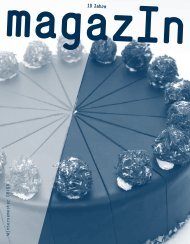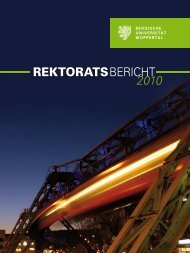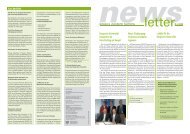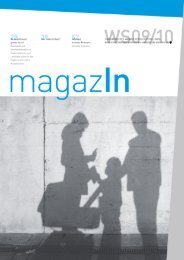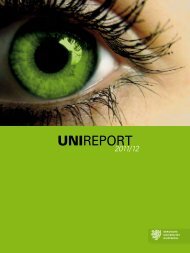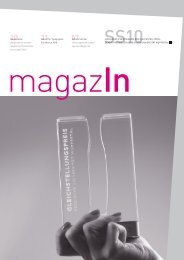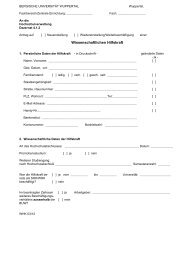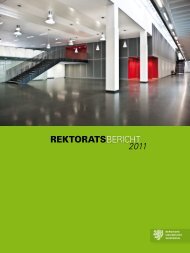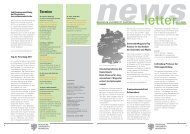international - Bergische Universität Wuppertal
international - Bergische Universität Wuppertal
international - Bergische Universität Wuppertal
Create successful ePaper yourself
Turn your PDF publications into a flip-book with our unique Google optimized e-Paper software.
58<br />
ChilDren are oUr fUtUre<br />
In line with the theore-<br />
tical and analytic meth-<br />
ods of current childhood<br />
research, UW’s Research<br />
Center for Children in Society<br />
investigates such issues as<br />
how childhood is to be understood<br />
today, how children<br />
grow up, and what opportunities<br />
for development are open<br />
to them in their own environment<br />
and in our societies as a<br />
whole. The Center is concerned<br />
with the role children play<br />
as social agents in various<br />
societies, along with its legal<br />
and political consequences.<br />
CHiLdren need<br />
ProteCtion<br />
Too little is still known about<br />
childhood and early cultural<br />
and educational development.<br />
So Prof. Klaus Schäfer,<br />
Permanent Secretary at<br />
NRW’s Ministry of the Family,<br />
Children, Youth, Culture<br />
and Sports, sees UW’s Research<br />
Center as holding a<br />
unique position: “For political<br />
decisions we need facts and<br />
data about what actually goes<br />
on in childhood.” The current<br />
debate on the protection of<br />
children, he observes, shows<br />
that society needs to face<br />
up to these issues. He concludes:<br />
“Here the <strong>Wuppertal</strong><br />
center can help.”<br />
CHiLdren need ACtiVe<br />
CoMMitMent<br />
UW’s Research Center aims<br />
to create a new platform for<br />
highly committed interdisciplinary<br />
research into childhood.<br />
The Center’s Management<br />
Board, Prof. Dr. Heinz Sünker<br />
(Department of Social<br />
Pedagogy and Politics), Prof.<br />
Dr. Charlotte Röhner (Department<br />
of Early Childhood and<br />
Primary School Pedagogy),<br />
and Dr. Gertrud oelerich (Department<br />
of Social Pedagogy),<br />
is guided by the need to do<br />
justice to the multiplicity and<br />
variety of childhood environments<br />
as well as theoretical<br />
positions.<br />
Prof. Dr. Heinz Sünker<br />
Research Center for Children<br />
in Society<br />
Tel. +49 (0)202-439-2295<br />
E-mail suenker@<br />
uni-wuppertal.de<br />
kwww.sozpaed.<br />
uni-wuppertal.de<br />
neW thinking for neW learning<br />
The human being is a<br />
learning animal. We<br />
all learn intensively at the<br />
beginning of our lives. We<br />
find our feet, investigate our<br />
environment and practice<br />
fundamental techniques of<br />
grasping, walking, talking<br />
– of accessing and forming<br />
our world. Because the immediate<br />
environment cannot<br />
provide enough opportunity<br />
and stimulus for knowledge,<br />
educational institutions take<br />
over this function. However,<br />
long before the PISA <strong>international</strong><br />
surveys we knew that<br />
teaching does not necessarily<br />
lead to learning. And that is<br />
where UW’s new research<br />
project Con@ct comes in.<br />
In our media-centered world,<br />
didactic models of learning have<br />
lost the leadership role, but<br />
what alternatives are there?<br />
Con@ct is investigating informal<br />
learning processes as yet<br />
rarely considered to qualify<br />
as didactic: creative organizations<br />
like Essen’s Unperfekthaus<br />
(Imperfect House) or<br />
Rakete (Rocket) in <strong>Wuppertal</strong>,<br />
which provide space for<br />
cultural and social activity and<br />
cooperation. The project aims<br />
to network such centers with<br />
university researchers and to<br />
inquire whether their goals<br />
and methods can be adopted<br />
to create a didactics and pedagogy<br />
for the future.<br />
These groups focus on the<br />
free and autonomous development<br />
of the individual, but<br />
their political aspect also consists<br />
in communal activity and<br />
commitment. The facilities<br />
they offer originate in, and are<br />
tailored to, the local community.<br />
Informal, self-motivated<br />
activity of this sort generates<br />
learning almost as a<br />
by-product, which virtually<br />
guarantees its vitality, and at<br />
the same time leads to democratic<br />
participation and social<br />
competence. Such concepts<br />
seem to harbor great potential<br />
for meeting, networking,<br />
mutual information, and the<br />
dissemination of knowledge,<br />
which will in many cases also<br />
generate economic success.<br />
Centers of this sort frequently<br />
offer co-working areas<br />
complete with infrastructure,<br />
where different organizations<br />
can operate in close spatial<br />
and spiritual proximity, sharing<br />
ideas as well as advice.<br />
The UW research network includes<br />
teams from Denmark,<br />
Sweden and the UK, as well<br />
as Germany. An Internet platform<br />
allows for discussion<br />
and refinement of project results.<br />
This has itself become<br />
a space of joint creativity,<br />
where projects can be planned,<br />
documented and published,<br />
ideas exchanged and<br />
discussed, and new forms of<br />
identity and involvement developed.<br />
Prof. Dr. Maria Anna<br />
Kreienbaum<br />
Katharina Knoll<br />
Faculty of Educational and<br />
Social Sciences<br />
(School Theory and General<br />
Didactics)<br />
Tel. +49 (0)202 439-2292<br />
E-mail kreienbaum@uni-wuppertal.de<br />
kwww.theorie-schule.uniwuppertal.de<br />
Kvater Huset in Copenhagen<br />
03_UW_RESEARCH<br />
59



